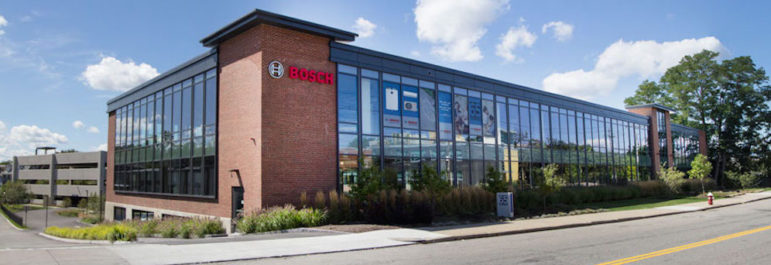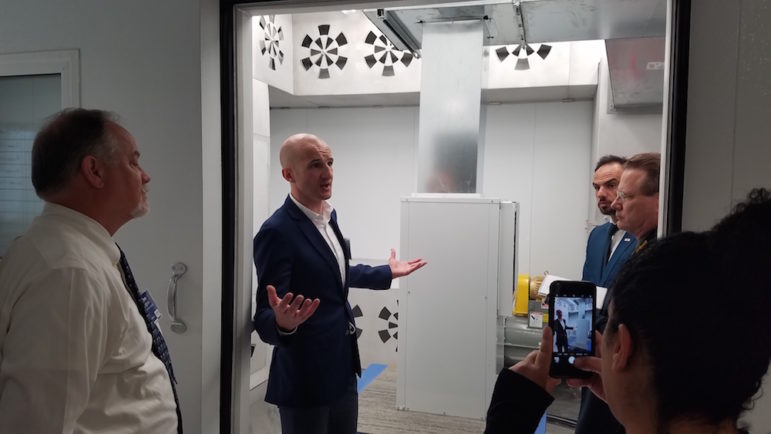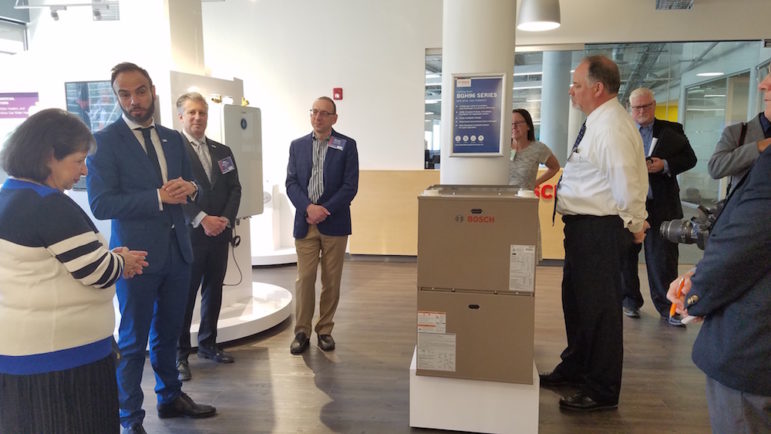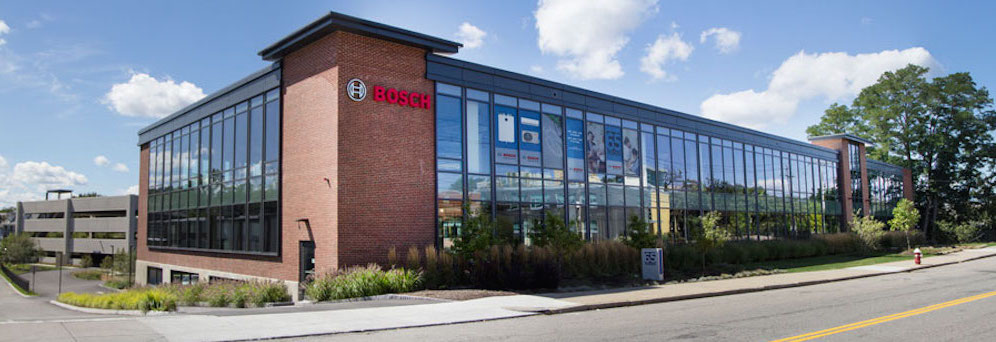
Contributed Photo
Bosch Thermotechology’s new research facility on Grove Street in Watertown was officially unveiled Monday.
Bosch welcomed local officials and the media during the official unveiling of its new research and development facility on Grove Street in Watertown where it will work on air conditioning, heating, and ways to control its products with smartphones or other technology.
The Bosch Thermotechnology Corp. facility was the first tenant of the renovated 65 Grove Street building. The company occupies the second floor of one half of the building, where it has 45 employees, who work in product development, human resources, sales and marketing, and business development.
“Our associates are excited to be here and be here for a long time,” said Vitor Gregorio, regional president of Bosch Thermotechnology.
The visual centerpiece of the facility is the Bosch Experience Center, where the company displays air conditioning units and water heaters and furnaces for both residential and commercial use. Bosch representatives can meet and greet customers and contractors at the Experience Center and show them the latest products.
Past the open office floor, which also has class office walls, are the labs where research and design occurs. The NVH (noise, vibration and harshness) lab is a room covered in dark grey foam, where the sound of A/C units are tested.
Bosch built two psychometric labs where heating and cooling equipment can be tested in different temperatures and humidity.
Finally, there is an electronics lab where engineers test not only the electronic components of its products, but also developed the smart technologies that allow people to control the heating and cooling of their homes using their smartphone, or even their Amazon Alexa.

Charlie Breitrose
The tour of Bosch’s facility included a look at the pshychometric lab where products can be tested in a variety of conditions.
The German-based company has been in the United States since 1906, but most of its business comes from the European market. Bosch hopes to change that and has invested in facilities in both the Americas and Asia, which are also the largest areas of growth, Gregorio said.
Bosch brought its home appliances to the U.S. first, and is known for its quiet dishwashers. Now, with the Thermotechnology facility the company is also aiming at the heating and cooling market. The first few years, Bosch brought in products developed in Europe and adapted it to the American market, but realized they needed to tailor the products to the customers.
“Since we are dealing with products for American customers, development for American business ramped up,” Gregorio said.
Some of the differences from Europe, he said, is that most North American homes have hot water tanks, but Bosch has products that heat the water on demand with no water storage. Also, Bosch’s most efficient HVAC systems use solar panels and geothermal technology, where ground water is brought up for heating or cooling.
The Watertown facility first opened in July, and the first new product developed there is a smart thermostat that can be controlled using a smart phone, Gregorio said. In July, a new furnace will be debuted that was created in the labs on Grove Street.

Charlie Breitrose
Watertown officials toured the Bosch Thermotechnology facility, including the Bosch Experience Center. Bosch Thermotechnology Regional President Vitor Gregorio, second from left, speaks with Councilor Angeline Kounelis, as Town Council Vice President Vinnie Piccirilli, center, and Assistant Town Manager Steve Magoon, far right, look on. The box is the new home furnace that will soon be introduced in the United States.
Bosch considered putting the Thermotechnology center on the West Coast or in Florida before deciding to put it in the Northeast. They decided the Boston area would be a good place because of its proximity to so many universities and leading companies, it has a large portion of Millennials and Bosch already has other offices in the area. They looked at spots around Boston, including Cambridge and Somerville before choosing Watertown.
Town Councilor Angeline Kounelis noted that the facility is in East Watertown, her district.
“I hope your associates will be part of our community and see Watertown as a place to live, work and play,” Kounelis said. “I hope they venture out to see what’s available in Coolidge Square.”
Gregorio said employees have already found places to eat and go out, and some are moving to town so they can live closer to where they work.
Council Vice President Vincent Piccirilli wondered how Bosch becomes involved in communities where it has facilities. Mike Mansuetti, president of Bosch North America, said Bosch has a foundation which works with local communities, mostly in the areas of STEM (science, technology, engineering and mathematics) and environmental sustainability.
